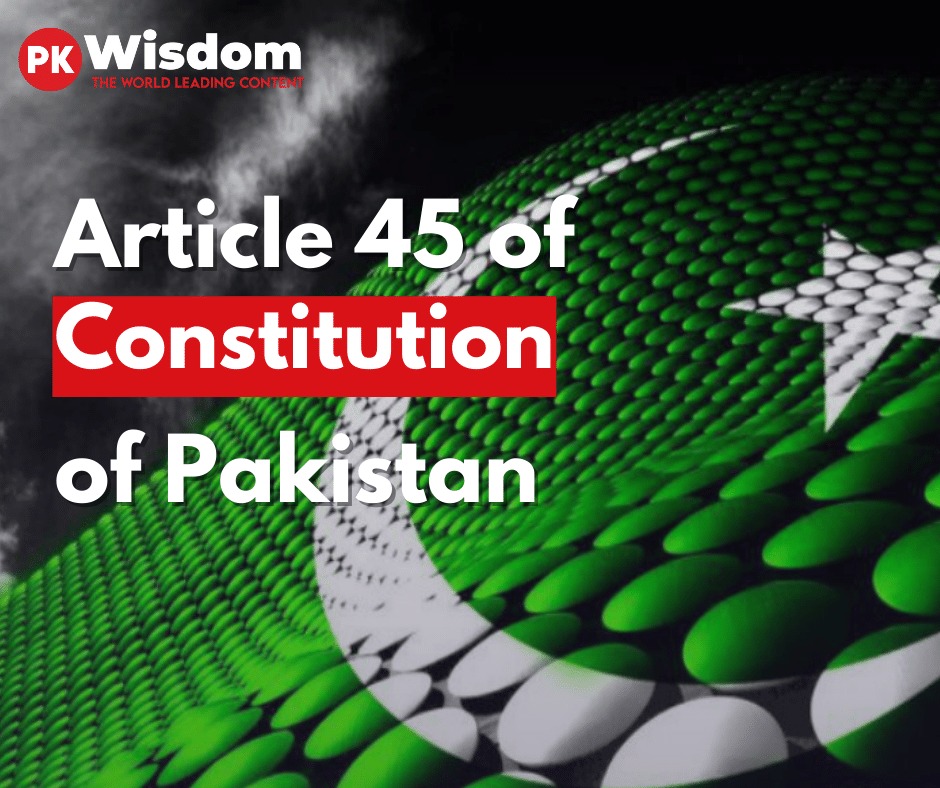Overview of Article 45 of the Constitution of Pakistan
The Constitution of Pakistan was adopted in 1973 to serve as a guiding document for governance, legal principles and rights within Pakistan. Article 45 stands out as an integral provision in this legal framework granting power to the President to grant pardons, reprieves, respite or exercise clemency by commuting sentences passed by courts, tribunals or other authorities. We’ll explore its details and implications within Pakistani legal terrain in this blog post.
Article 45 States
45. President’s power to grant pardon, etc.
The President shall have power to grant pardon, reprieve and respite, and to remit, suspend or commute any sentence passed by any court, tribunal or other authority.
This article explicitly empowers the President to take actions related to sentences imposed by judicial or administrative bodies. The range of presidential powers granted under this provision is vital for maintaining a balance between the justice system and the executive branch of the government.
Key Points of Article 45 of the Constitution of Pakistan
To understand the significance of Article 45, we must explore its main components:
- Pardon and Reprieve: The President can grant pardons, which absolve an individual of legal repercussions for crimes they have committed, and reprieves, which temporarily delay an execution sentence, under certain circumstances. These powers provide essential flexibility when it comes to acting with mercy or fairness in particular circumstances.
- Respite: In exceptional circumstances, the President can grant temporary respite of a sentence. This power may prove useful when an individual needs more time to appeal their verdict or for other urgent purposes.
- Remission, Suspension and Commutation: According to Article 45, the President may exercise his powers under this article to remit (reduce), suspend (temporarily stop), or commute (reduce or alter) sentences issued by courts or other authorities as part of a mechanism designed to address sentencing disparities, undue severity or humanitarian considerations.
- Balance of Justice and Compassion: Article 45 is designed to strike a balance between justice and compassion, so as to allow for any cases where sentences have been excessively punitive, unjust or cruel to be rectified by executive branch authorities.
Download the Constitution of Pakistan in PDF
Crux of Article 45 of the Constitution of Pakistan
Article 45’s foundation rests upon several essential facets:
- Checks and Balances: In any democracy, provision is an integral element of its system of checks and balances, providing protection from decisions that could be overly harsh or unequally applied by courts.
- Humanitarian Considerations: Clemency grants allow us to consider humanitarian considerations when dispensing justice – making sure it’s both impartial and compassionate.
- Maintain Legal Fairness: Article 45 is an integral component of Pakistan’s legal system, ensuring that legal proceedings are not only just but can also adapt to special situations as they arise.
- Presidential Responsibility: Exercising this power with great caution requires considerable responsibility on the President; they must ensure it serves both justice and welfare considerations for those affected by legal systems.
Conclusion: Article 45 of the Constitution of Pakistan
Conclusion – Pakistan’s 1973 Constitution shows its dedication to justice, fairness, and compassion through Article 45’s provision that empowers its President to intervene in legal proceedings to address sentencing disparities, humanitarian needs, or principles of justice that violate basic ethical norms. This provision acts as an important safeguard against potential injustices while making sure Pakistan’s legal landscape remains fair and humane.
The Constitution of Pakistan, with articles like Article 45, supports justice, rule of law and respect for individual rights. For legal scholars, concerned citizens or anyone interested in Pakistan’s constitutional law, Article 45 serves as a pivotal component for shaping its approach to legal fairness and justice in Pakistan.


